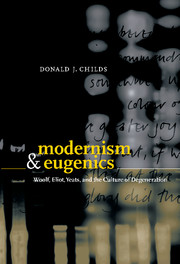Book contents
- Frontmatter
- Contents
- Introduction
- Chapter 1 Virginia Woolf's hereditary taint
- Chapter 2 Boers, whores, and Mongols in Mrs. Dalloway
- Chapter 3 Body and biology in A Room of One's Own
- Chapter 4 Eliot on biology and birthrates
- Chapter 5 To breed or not to breed: the Eliots' question
- Chapter 6 Fatal fertility in The Waste Land
- Chapter 7 The late eugenics of W.B. Yeats
- Chapter 8 Yeats and stirpiculture
- Chapter 9 Yeats and The Sexual Question
- Notes
- Index
Chapter 6 - Fatal fertility in The Waste Land
Published online by Cambridge University Press: 22 September 2009
- Frontmatter
- Contents
- Introduction
- Chapter 1 Virginia Woolf's hereditary taint
- Chapter 2 Boers, whores, and Mongols in Mrs. Dalloway
- Chapter 3 Body and biology in A Room of One's Own
- Chapter 4 Eliot on biology and birthrates
- Chapter 5 To breed or not to breed: the Eliots' question
- Chapter 6 Fatal fertility in The Waste Land
- Chapter 7 The late eugenics of W.B. Yeats
- Chapter 8 Yeats and stirpiculture
- Chapter 9 Yeats and The Sexual Question
- Notes
- Index
Summary
That The Waste Land is about fertility is not news. Eliot himself pointed to the studies of fertility rituals that inspired him – “Jessie L. Weston's book on the Grail legend: From Ritual to Romance … [and] another work of anthropology … The Golden Bough; I have used especially the two volumes Adonis, Attis, Osiris. Anyone who is acquainted with these works will immediately recognise in the poem certain references to vegetation ceremonies” (CPP p. 76). From the beginning, critics saw fertility as an important theme. In an early review, Edmund Wilson describes Eliot's waste land as “a desolate and sterile country, ruled over by an impotent king, in which not only have the crops ceased to grow and the animals to reproduce their kind, but the very human inhabitants have become unable to bear children.” In New Bearings in English Poetry (1932), F. R. Leavis reads the references to “Vegetation cults” and “fertility ritual” as a reminder of the “remoteness” of modern “human culture” from “natural rhythms”: “Sex here is sterile, breeding not life and fulfilment but disgust, accidia, and unanswerable questions.” Cleanth Brooks reads infertility as a symbol of the decline of Christianity's influence: for Eliot “Christian terminology is … a mass of clichés,” and so, since he cannot deal with the Christian material directly, “[t]he theme of resurrection is made on the surface in terms of the fertility rituals.”
- Type
- Chapter
- Information
- Modernism and EugenicsWoolf, Eliot, Yeats, and the Culture of Degeneration, pp. 121 - 148Publisher: Cambridge University PressPrint publication year: 2001

